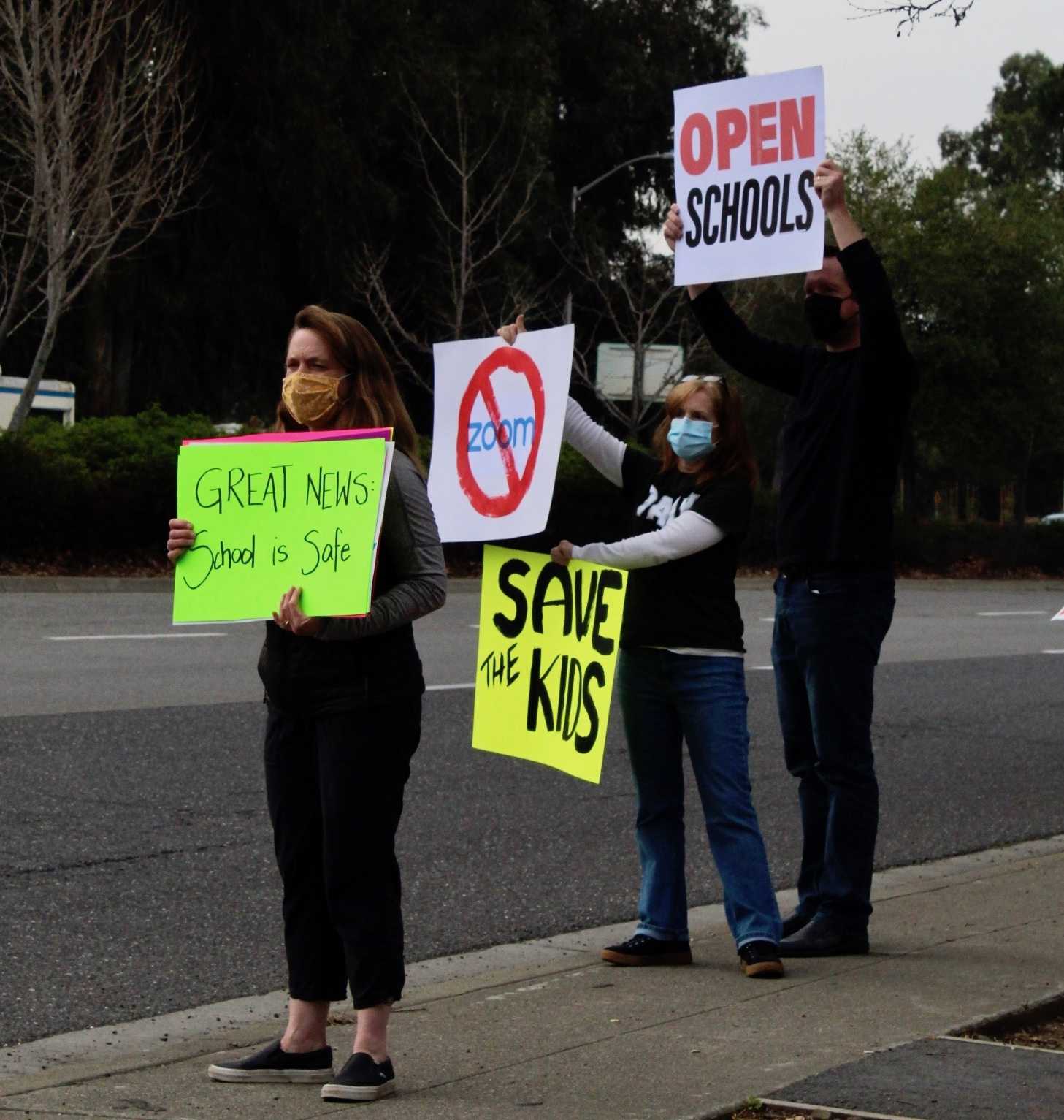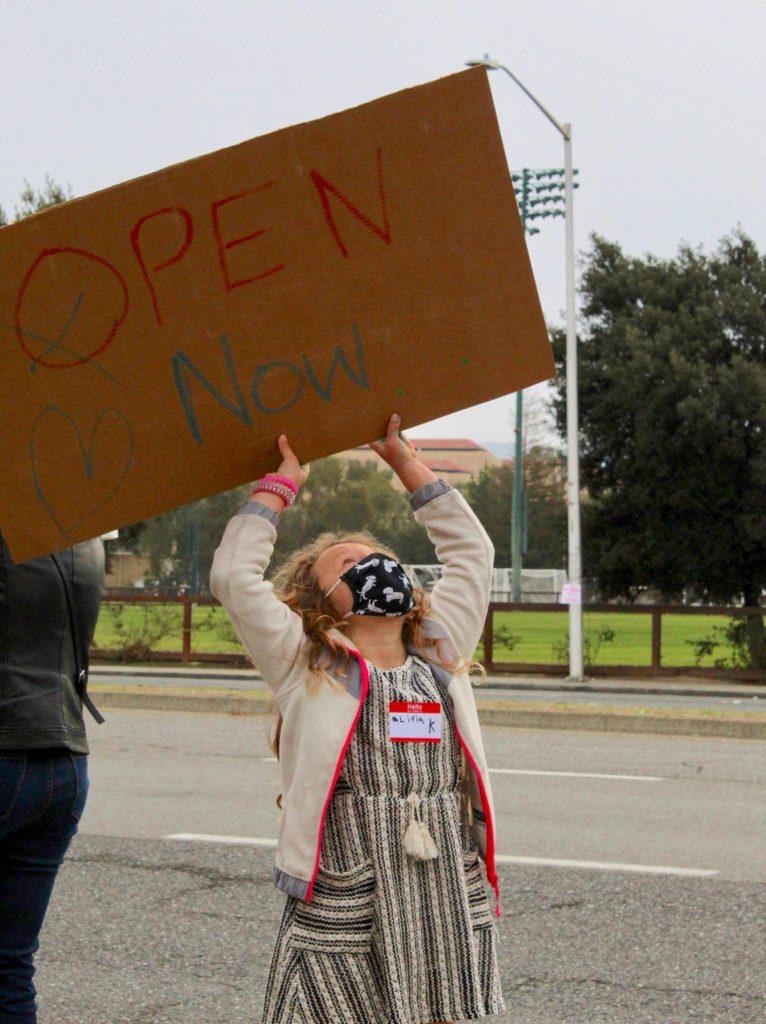Depressed. Anxious. Zombie-like shells of what they once were. That is how a mother of two Palo Alto Unified School District secondary students described her own children at the Feb. 2 school board meeting.
Her high school daughter was a straight-A student and had just managed to make a group of friends despite being shy. Then, COVID-19 hit. Schools were shut down, all extracurriculars were either cut short or forced online and the world was put on hold.
Many hope the COVID-19 vaccine will shove the world back into normality. If only things were so simple. The California vaccine rollout has been painfully slow, and plans are constantly changing. Many who were promised prioritization find themselves far back in line, if at all.
“I am very fortunate to be vaccinated, but I am still not ready to go to work given that I have very little confidence with the protocols.”
Story continues below advertisement— Aria Sufiani, PAUSD employee
Teachers were to begin receiving the vaccinations in late January according to California’s original rollout plan. However, teachers in Santa Clara County are still not eligible to receive their first injection as of Feb. 12.
Palo Alto High School English teacher David Cohen awaits the announcement of when he and his coworkers can receive the vaccine, and believes that it may be the key to a speedy reopening.
“The sooner we have more teachers vaccinated, the sooner we can have schools up and running safely,” Cohen said.
Tentative teachers
At the Feb. 9 board meeting, Superintendent Don Austin announced plans to bring Grades 7-12 back onto campus for “Zoom in a room.” According to Austin, students can return to school as early as March 1 if Santa Clara County is in the state’s red tier of pandemic risk for five consecutive days. This announcement, which came only a week after the news that sixth grade students would have the option to return to campus for hybrid learning, riled up the already impassioned parents, teachers and students.
Read thread: COVID risks in schools/children on the rise in Europe, Canada. I’m not disputing there’s also evidence some schools and kids have kept open and safe, but tired of dismissive patronizing attitude towards people who worry and are told school safety is well established https://t.co/Z5wSYLi062
— David (@CohenD) February 3, 2021
Paly teacher Mimi Park does not feel comfortable returning until she has received the vaccine, and would be morally uncomfortable returning when students are not yet vaccinated.
“I think about the high cost to life and physical life of people that I genuinely care about: my students, the staff members, all of that,” Park said. “It’s really hard to imagine the kind of benefits [of in-person learning] really outweighing that, until we get to a situation where we have herd immunity.”

Henry M. Gunn High School Student Attendant Aria Sufiani has already received his vaccination, but is against reopening.
“I am very fortunate to be vaccinated, but I am still not ready to go to work given that I have very little confidence with the protocols,” Sufiani said at the Feb. 9 board meeting. “I do want to support my students, but please, I’m 30 years old, I have other friends and colleagues who are dealing with the aftermath of COVID-19 … please consider our [PAUSD employees] health too.”
Jane Lathrop Stanford Middle School teacher Noel Berghout who, like most teachers, has not received her vaccine, urged the board at the Feb. 2 meeting to hold off on reopening schools.
“Vaccine availability is just around the corner and with the [vaccine] rollout being slow, we are unlikely to get protection prior to March 1,” Berghout said. “We are so close to having better protection for vulnerable groups, and yet we are rushing in ahead of this important milestone by reopening campus in advance of what was originally stated.”
Many looked towards Palo Alto Educators Association president Teri Baldwin for her stance at the Feb. 9 meeting, but she did not explicitly state whether she supported or opposed the plan. Instead, Baldwin said she wanted answers to the union’s questions and more details on the plan’s specifics.
Parents protest
The majority of the parents who spoke at the school board meetings were in full support of PAUSD’s plan to bring the secondary students back on campus. One day prior to the board meeting where Austin announced the return of secondary grades, approximately 100 parents attended a protest demanding the reopening of Grades 7-12 at the PAUSD district office.
“We are sick and tired of these Zoom meetings, writing to the school board and all the hollow words which have not led anywhere,” PAUSD parent and protest attendee Ashima Agarwal said. “Our kids are dying from inside and the teachers and school board are responsible for that.”
While teachers voice concerns, many parents feel returning to school is safe following the proper guidance from major medical institutions such as the Center for Disease Control and Prevention and the American Pediatric Association.
“I am reassured by all the robust scientific data from all over the world and nationally demonstrating that schools can be safely reopened and it can be done without vaccination,” PAUSD parent and immunologist Annemarie Lekkerkerker said at the meeting. “We have evidence in our district that it can be done, so please let our kids go back to campus for in-person learning.”
Elementary return
While the debate of whether secondary schools should return rages, some elementary school classrooms have been open since October. James Holbrook, a teacher at Duveneck Elementary School, has been teaching in-person for almost five months, and is a strong supporter of getting teachers vaccinated and back to school.
“I think we really do need to get children back in school, and I don’t think that the online format of learning is really effective,” Holbrook said. “I think vaccines are a really easy way to kind of take that fear out of lots of teachers to go back to school.”
Although hybrid learning has its downsides and Holbrook would like to see some changes to the elementary school hybrid schedule, he recognizes that there is no replacement for in-person learning.
“I thought I taught them [students] some things, and then when they came in, I was like, ‘I guess I didn’t teach them that,’” Holbrook said. “It’s just good to kind of see what they’re capable of, in the flesh. So I think the big takeaway from all of this [distance learning] is that you cannot replace human interaction in education, period.”
PAEA President Teri Baldwin asked the #PAUSD community and Board to bear in mind that some of our members are already working in person; risks are real, and concern about those risks not irrational.
— PaloAltoEducatorsAsc (@PaloAltoEduAsc) February 10, 2021
Unlike elementary schools, secondary schools are nearing a full year of closure, and parents and students are getting impatient. Since the March lockdown, the mother who spoke to the school board has seen the effect of distance learning and has become so concerned about her daughter’s plummeting grades and lack of in-person contact with friends that she is now seeking professional help.
“We are faced with finding a therapist and maybe using medication just to get by,” she said. “The school district, the unions, the teachers association are failing and hurting our kids. We are so desperate that we are willing to risk the stress of moving just to get our kids to an in-person school.”



